- Home
- Tom Sharpe
Riotous Assembly Page 2
Riotous Assembly Read online
Page 2
If Piemburg was the garden of Kommandant van Heerden’s soul where he could wander happily dreaming of great men and great deeds done, Miss Hazelstone of Jacaranda Park was the key plant, the corner tree of this interior landscape. Not that she was young or beautiful or charming or even in any sense likeable. She was none of these things. She was old, ugly, garrulous and abrupt to the point of rudeness. Hardly alluring qualities but to the Kommandant they were filled with extraordinary attractions. These were all the attributes of the English. To hear Miss Hazelstone’s voice, high-pitched, loud and utterly unselfconscious, was to hear the true voice of the British Empire. To be chided, nay, trounced by Miss Hazelstone for infringing his authority by cautioning her chauffeur for driving at 80 m.p.h. through a built-up area in a 1936 Hudson Terraplane with defective brakes was a pleasure almost too great to be borne. He treasured her refusal to grant him any title. ‘Van Heerden,’ she would snarl from the back of the sedan, ‘you exceed your authority. Driver, proceed’, and the car would drive off leaving the Kommandant marvelling at her savoir-faire.
Then again on the rare occasions that he could find an excuse to visit Jacaranda House, Miss Hazelstone would receive him, if she deigned to see him at all, at the servants’ entrance and would dispatch him with an economy of incivility and an abundance of implicit contempt that left the Kommandant breathless with admiration.
With Luitenant Verkramp she was even ruder, and when the Kommandant could endure the Security Branch man’s insolence no longer he would invent reasons for him to call at Jacaranda House. Luitenant Verkramp had made the mistake on his first visit of addressing Miss Hazelstone in Afrikaans and ever since she had spoken to him in Kitchen Kaffir, a pidgin Zulu reserved only for the most menial and mentally retarded black servants. Luitenant Verkramp returned from these penitential trips speechless with rage and vented his spleen by submitting security reports on the Hazelstone family accusing the old woman of subversion and of fomenting civil disorder. These memoranda he sent to Pretoria with the recommendation that Miss Hazelstone’s activities be brought to the attention of the State Attorney.
The Kommandant doubted that the reports enhanced Verkramp’s reputation for accuracy or for political reliability. He had forgotten to tell his second-in-command that Miss Hazelstone was the only daughter of the late Judge Hazelstone of the Supreme Court who was known in the legal world as Breakneck Bill and who, in a Minority Report of the Commission on Traffic Congestion, had advocated that flogging be made mandatory for parking offences. With such antecedents, it seemed unlikely to the Kommandant that BOSS would question Miss Hazelstone’s patriotism. English she might be, subversive and criminal never.
It came therefore as all the more of a shock when he heard Konstabel Els answer the phone in the outer office and the strident tones of Miss Hazelstone vibrating from the receiver. Interested to see how Els would suffer at her hands, the Kommandant listened to the conversation.
Miss Hazelstone was telephoning to report that she had just shot her Zulu cook. Konstabel Els was perfectly capable of handling the matter. He had in his time as a police officer shot any number of Zulu cooks. Besides there was a regular procedure for dealing with such reports. Konstabel Els went into the routine.
‘You wish to report the death of a Kaffir,’ he began.
‘I have just murdered my Zulu cook,’ snapped Miss Hazelstone.
Els was placatory. ‘That’s what I said. You wish to report the death of a coon.’
‘I wish to do nothing of the sort. I told you I have just murdered Fivepence.’
Els tried again. ‘The loss of a few coins doesn’t count as murder.’
‘Fivepence was my cook.’
‘Killing a cook doesn’t count as murder either.’
‘What does it count as, then?’ Miss Hazelstone’s confidence in her own guilt was beginning to wilt under Konstabel Els’ favourable diagnosis of the situation.
‘Killing a white cook can be murder. It’s unlikely but it can be. Killing a black cook can’t. Not under any circumstances. Killing a black cook comes under self-defence, justifiable homicide or garbage disposal.’ Els permitted himself a giggle. ‘Have you tried the Health Department?’ he inquired.
It was obvious to the Kommandant that Els had lost what little sense of social deference he had ever possessed. He pushed Els aside and took the call himself.
‘Kommandant van Heerden here,’ he said. ‘I understand that there has been a slight accident with your cook.’
Miss Hazelstone was adamant. ‘I have just murdered my Zulu cook.’
Kommandant van Heerden ignored the self-accusation. ‘The body is in the house?’ he inquired.
‘The body is on the lawn,’ said Miss Hazelstone. The Kommandant sighed. It was always the same. Why couldn’t people shoot blacks inside their houses where they were supposed to shoot them?
‘I will be up at Jacaranda House in forty minutes,’ he said, ‘and when I arrive I will find the body in the house.’
‘You won’t,’ Miss Hazelstone insisted, ‘you’ll find it on the back lawn.’
Kommandant van Heerden tried again.
‘When I arrive the body will be in the house.’ He said it very slowly this time.
Miss Hazelstone was not impressed. ‘Are you suggesting that I move the body?’ she asked angrily.
The Kommandant was appalled at the suggestion. ‘Certainly not,’ he said. ‘I have no wish to put you to any inconvenience and besides there might be fingerprints. You can get the servants to move it for you.’
There was a pause while Miss Hazelstone considered the implications of this remark. ‘It sounds to me as though you are suggesting that I should tamper with the evidence of a crime,’ she said slowly and menacingly. ‘It sounds to me as though you are trying to get me to interfere with the course of justice.’
‘Madam,’ interrupted the Kommandant, ‘I am merely trying to help you to obey the law.’ He paused, groping for words. ‘The law says that it is a crime to shoot Kaffirs outside your house. But the law also says it is perfectly permissible and proper to shoot them inside your house if they have entered illegally.’
‘Fivepence was my cook and had every legal right to enter the house.’
‘I’m afraid you’re wrong there,’ Kommandant van Heerden went on. ‘Your house is a white area and no Kaffir is entitled to enter a white area without permission. By shooting your cook you were refusing him permission to enter your house. I think it is safe to assume that.’
There was a silence at the other end of the line. Miss Hazelstone was evidently convinced.
‘I’ll be up in forty minutes,’ continued van Heerden, adding hopefully, ‘and I trust the body—’
‘You’ll be up here in five minutes and Fivepence will be on the lawn where I shot him,’ snarled Miss Hazelstone and slammed down the phone.
The Kommandant looked at the receiver and sighed. He put it down wearily and turning to Konstabel Els he ordered his car.
As they drove up the hill to Jacaranda Park, Kommandant van Heerden knew he was faced with a difficult case. He studied the back of Konstabel Els’ head and found some consolation in its shape and colour.
If the worst came to the worst he could always make use of Els’ great gift of incompetence and if, in spite of all his efforts to prevent it, Miss Hazelstone insisted on being tried for murder, she would have as the chief prosecution witness against her, befuddled and besotted, Konstabel Els. If nothing else could save her, if she pleaded guilty in open court, if she signed confession after confession, Konstabel Els under cross-examination by no matter how half-witted a defence attorney would convince the most biased jury or the most inflexible judge that she was the innocent victim of police incompetence and unbridled perjury. The State Attorney was known to have referred to Konstabel Els in the witness box as the Instant Alibi.
3
It was with these thoughts in mind that Kommandant van Heerden drove down the drive to Jacaranda House. They interrupted o
nly briefly the aesthetic pleasure he always felt in the presence of relics of the British Empire, for Jacaranda House was pure Cecil Rhodes and Bishop Colenso.
Rambling and stuccoed, the massive edifice had been jerry-built to last. In style it managed to combine elements of both East and West. In Jacaranda House the twain had met. At first sight it looked as though Windsor Castle had been used for the artificial insemination of the Brighton Pavilion and from its crenellated gables to its tiled and columned verandah it succeeded with an eclecticism truly English in bringing more than a touch of the durbah to a building as functionally efficient as a gents. Whoever had built Jacaranda House might not and almost certainly did not know what he was doing, but he must have been a positive genius even to have known how.
As the police car drew up, the great Gothic front door was opened by an Indian butler, wearing white gloves and a red sash, who led the Kommandant and his assistant through a vast hall whose walls were patinaed with the mouldering heads of one wart-hog, sixteen buffaloes, ten lions and numerous lesser fauna, which heads the late Judge Hazelstone had purchased at an auction to sustain his totally unwarranted reputation as a big-game hunter. To add to the impression that they were in the jungle a profusion of potted plants and ferns reached their dusty fronds up to the plaster fan-vaulting. The corridor and the great sitting-room through which they passed were similarly decorated with the portraits of long-dead Hazelstones, and when at last they came out on to the verandah at the back of the house, Kommandant van Heerden’s regard for Imperial Britain had increased by leaps and bounds.
Miss Hazelstone had chosen the scene of her crime with a sense of propriety and occasion which belonged to a distant and leisurely age. The body of Fivepence lay on an immaculate lawn and was huddled in a suitably obeisant rigour at the foot of a pedestal on which had stood the bust of Sir Theophilus Hazelstone, GCR, GCSI, DSO, and one-time Governor of Zululand and Viceroy of Matabeleland; which bust had been erected at the conclusion of the Zulu Rebellion to commemorate Sir Theophilus’ victory at Bulundi over seventeen thousand unarmed Zulus who had misguidedly assumed that Sir Theophilus had invited them there for an indaba as the representative of the Great White Queen. The ensuing massacre was noted in military history as the first occasion on which ten-inch naval guns had been fired at the point-blank range of twelve yards with the resultant deaths by shrapnel of half their gun crews. In later stages of the battle this mistake had been rectified and the naval guns had been used at long range to decimate the fleeing Zulus to such good effect that they had destroyed four farmhouses and a British blockhouse on the Tugela River some seven miles beyond the actual battlefield. These innovations in the art of military strategy had earned Sir Theophilus his knighthood and a bar to his DSO, not to mention the admiration of his surviving officers and men, and had added to his reputation for scrupulous honesty and fair play among the tribesmen who, maimed and mutilated, managed to survive the holocaust. During his reign as Governor, Zululand knew a decade of untroubled peace and on his death a generation of Zulu widows came out of mourning.
It was on the reputation of such heroes as Sir Theophilus that Kommandant van Heerden’s admiration for the British and their Empire had been formed. Reputation, it seemed to the Kommandant, was all that remained to Sir Theophilus. Certainly his bust had disappeared from its pedestal and lay fragmented over half an acre of otherwise spotless lawn. Beyond the lawn the trunks of the gum trees were gashed and splintered and the azalea bushes looked as though they had been the subject of the concentrated attention of some very large and desperately hungry animal. Branches and leaves lay scattered and torn in a gap some twenty yards across.
For a moment the Kommandant drew fresh hope that Fivepence’s sudden death must have been the result not of any human agency but of some natural cataclysm in the order of a freak tornado which had passed without a shadow of a doubt well noticed through Jacaranda Park but unremarked in the rest of Piemburg. This brief spasm of optimism died almost as soon as it was born. It was all too obvious that whatever other gifts Miss Hazelstone had inherited from her illustrious Imperial forebears, Sir Theophilus had left her with a marked propensity for enormous firearms and their use at quite unnecessarily close range.
She sat, a thin, angular, almost frail, elderly lady dressed in dark chiffon with lace to her throat, in a frail, elderly wicker chair complete with an unnecessary antimacassar and cradled in her lap lay a weapon which startled Kommandant van Heerden and even Konstabel Els and which explained all too readily the scene of devastation that lay beyond the contorted figure of Fivepence and the bustless pedestal. It was a four-barrelled rifle, some six feet in length, and its bore was of a diameter so large that it suggested one of Sir Theophilus’ favourite weapons, the ten-inch naval gun. Kommandant van Heerden’s experienced eye told him immediately that this was no standard firearm licensed for self-defence.
‘This is the murder weapon,’ said Miss Hazelstone, evidently reading his thoughts. She patted the four barrels and van Heerden noted that she was obviously determined to leave no part of the gun free of finger-prints.
The Kommandant eyed the rifle cautiously. ‘What is it?’ he inquired at last.
‘It’s a magazine-loaded multi-barrelled elephant gun,’ Miss Hazelstone replied. ‘It was designed by my father, the late Judge Hazelstone, and made to his own specifications. Its rate of fire is forty bullets a minute and it can incapacitate a charging elephant at a thousand yards.’
Van Heerden volunteered the opinion that it seemed unnecessary to kill elephants at a thousand yards. He couldn’t bring himself to use the word ‘incapacitate’. It seemed inappropriately modest. Evaporate seemed more likely.
‘My father was a lousy shot,’ Miss Hazelstone continued. ‘Besides, he was a dreadful coward.’
‘No man who fired that gun could be called a coward,’ said the Kommandant both gallantly and truthfully. He was beginning to find the interview quite relaxing. Murder had evidently brought a new touch of humanity to Miss Hazelstone. She was treating him with unaccustomed civility. The Kommandant decided that the time had come to resume his defence of Miss Hazelstone’s innocence.
‘That rifle is far too heavy for a woman … I beg your pardon … for a lady to use,’ he said, and regretted the remark almost as soon as it was made. It was evident that Miss Hazelstone would respond to any challenge. She rose from her chair and aimed the great rifle into the garden.
The Kommandant had discounted any possibility that she might fire the thing. Konstabel Els, for once, acted with greater resourcefulness and threw himself to the ground. That the ground he chose was already occupied by a large Dobermann Pinscher and that the dog chose to dispute the right of Konstabel Els to lie prone on it and that in any case all South African dogs are trained to bite persons of Negro extraction and that Konstabel Els was of sufficiently mixed blood to justify biting on suspicion, all this was lost to Kommandant van Heerden as Miss Hazelstone, aiming now at the ground and now at the sky, pulled the trigger.
The Kommandant, who was standing some eighteen inches to the right of the four barrels and almost level with their muzzles and who, but an instant before, had been a rational-thinking human being in full possession of his senses, found himself, as it seemed to him, in a vast and rapidly expanding bubble of flame. The sensible world of garden, sky, twittering birds, even the screams of Els being savaged by the Dobermann, all disappeared. Kommandant van Heerden knew only the absolute silence at the still heart of an enormous explosion. There was no pain, no anxiety, no thought, only the certain realization not that the end of the world was at hand, but that it had already been irremediably accomplished. For one brief, illuminating moment Kommandant van Heerden experienced the highest form of mystical understanding, total bodily dissolution. It was some time before he returned to the world of physical sensation and too late for him to hear anything of the thunderclap that volleyed forth from Jacaranda Park in the direction of the Drakensberg Mountains. With the glazed eyes of an awakened
sleepwalker and the singed moustache that comes from standing too close to an enormous gun barrel, he looked at the scene around him. It was not one to reassure a man doubtful of his own sanity.
Konstabal Els’ contretemps with the Dobermann had been exacerbated, to put it mildly, by the broadside. It was doubtful which of the two animals had been more maddened by the roar of the elephant gun. The dog, which had at first bitten Konstabel Els’ ankle to the bone, had transferred its attentions to his groin and once there had developed all the symptoms of lockjaw. Els, conservative as ever, and having nothing else to bite on except the Dobermann’s backside, was applying his knowledge, gained in several thousand interrogations of Africans, of what he cheerfully called ‘ball-bashing’ but which in the autopsy reports on some of his patients was termed severe contusions to the testicles.
Kommandant van Heerden turned what remained of his attention away from this unpleasant spectacle and tried to look at Miss Hazelstone who lay stunned but satisfied in the wicker chair where the kick of the rifle had thrown her. Through his singed eyelashes the Kommandant could partially see that she was addressing him because her lips were moving but it was some minutes before he recovered his hearing sufficiently to be able to make out what she was saying. Not that he found her remarks at all helpful. It seemed positively gratuitous to repeat, ‘There you are. I told you I could fire the gun,’ and the Kommandant began to wonder if he had not been a trifle unjust to Luitenant Verkramp. Miss Hazelstone was after all a woman who would stick at nothing.
Her second firing had destroyed what remained of the pedestal on which Sir Theophilus’ bust had stood and, being aimed at ground level, had almost obliterated all traces of Fivepence’s recently obeisant corpse. Almost but not entirely, for the fragmentary and dispersed remains of Sir Theophilus’ bust had been joined on their widely separated patches of lawn by the no less fragmentary and dispersed remains of the late Zulu cook, while patches of black skin had attached themselves limpet-like to the blasted trunks of the gum trees that fringed the once-immaculate lawn. Kommandant van Heerden couldn’t bring himself to focus on the round black object that kept trying to draw attention to itself by swinging wistfully from a branch in the upper reaches of an otherwise attractive blue gum. Down the centre of the lawn the elephant gun had cut a straight trench some eight inches in depth and fifteen yards long from whose serrated edges arose what the Kommandant despairingly hoped was steam.

 Blott on the Landscape
Blott on the Landscape Porterhouse Blue
Porterhouse Blue The Wilt Alternative:
The Wilt Alternative: The Great Pursuit
The Great Pursuit Ancestral Vices
Ancestral Vices The Midden
The Midden Vintage Stuff
Vintage Stuff The Throwback
The Throwback Grantchester Grind:
Grantchester Grind: Wilt on High:
Wilt on High: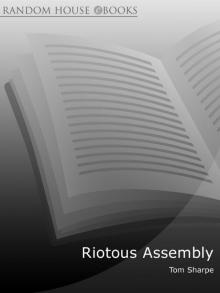 Riotous Assembly
Riotous Assembly Indecent Exposure
Indecent Exposure The Gropes
The Gropes Wilt in Nowhere:
Wilt in Nowhere: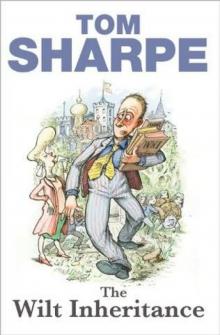 The Wilt Inheritance
The Wilt Inheritance Wilt:
Wilt: The Wilt Alternative
The Wilt Alternative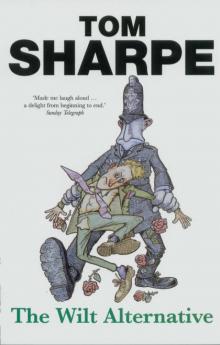 The Wilt Alternative w-2
The Wilt Alternative w-2 Grantchester Grind
Grantchester Grind Wilt on High
Wilt on High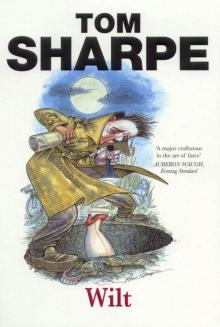 Wilt w-1
Wilt w-1 Wilt
Wilt The Wilt Inheritance (2010)
The Wilt Inheritance (2010) Wilt in Nowhere
Wilt in Nowhere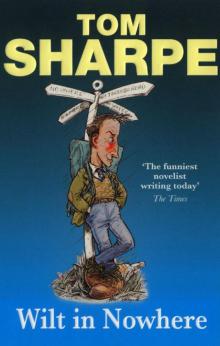 Wilt in Nowhere w-5
Wilt in Nowhere w-5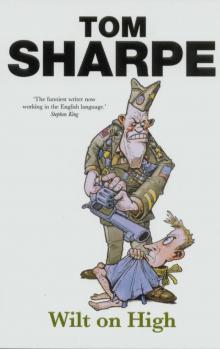 Wilt on High w-3
Wilt on High w-3